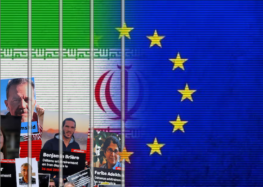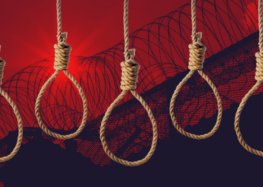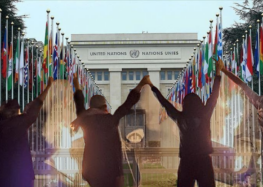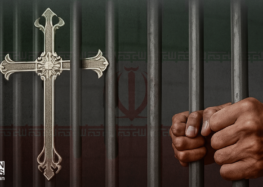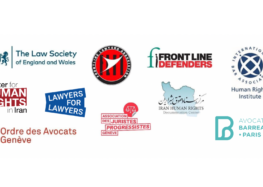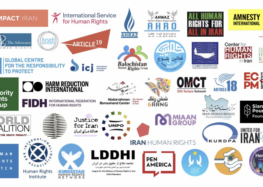“Banditry and Extortion” Replace “Apostasy” Charges for Christian Pastor!

Youcef Nadarkhani
Youcef Nadarkhani, a Christian pastor accused of apostasy will be put on a new trial on August 27. Nadarkhani, who refused to repent from being a Christian in earlier judicial proceedings and faces a death sentence, is now facing the new charges of “banditry and extortion.”
The Christian pastor’s earlier charges were “apostasy” and “converting to Christianity,” but the new charges of “banditry and extortion” were first mentioned last year on Fars News Agency. A source close to the case of Youcef Nadarkhani who wishes to remain anonymous on security grounds told the International Campaign for Human Rights in Iran that, “Mr. Nadarkhani’s ‘banditry’ charges are fundamentally meaningless; he is not a thief or a bandit. This is a new accusation leveled against him for unknown reasons.”
Youcef Nadarkhani, 33, was born to Muslim parents and converted to Christianity at the age of 19. Prior to his arrest, he led a congregation of about 400 Christians in the Northern city of Rasht. Nadarkhani’s death sentence on charges of apostasy was upheld by Branch 11 of Gilan Province’s Appeals Court on August 23, 2010. On June 28, 2011, Iran’s Supreme Court overturned the ruling, but made the decision conditional on Nadarkhani’s repentance. There were three court sessions between September 25 and September 28, 2011 in which Youcef Nadarkhani was asked to repent and he refused. Nadarkhani is currently in detention inside Rasht Prison.
On September 30, 2011, the charge of “extortion” was mentioned for the first time on Fars News Agency’s website in a news article about Nadarkhani. The article claimed that Youcef Nadarkhani is accused of rape and repeated extortion. “Youcef Nadarkhani has [committed] security crimes and had set up a house of corruption. This individual is a criminal and his crime is not inviting some to the religion of Christianity, but he has security crimes. Nadarkhani’s death sentence has been issued for security crimes,” Fars quoted Gholamali Rezvani, Deputy Governor of Gilan for Security.
Related articles:
– Nadarkhani Refuses to Repent; Awaiting Final Ruling on Apostasy Death Sentence
– Apostasy Verdict Delayed So Pastor Can Repent
Mohammad Ali Dadkhah, Nadarkhani’s lawyer, told the International Campaign for Human Rights in Iran at the time, “If he is under trial in another court on other charges, I am not aware. But we only defended him against the death sentence in the case of his charge of apostasy. The charge the court staff announced that I defended during several different court sessions was apostasy and no other charge.”
The new leveled charges raise concern that following widespread international criticism about the ruling issued for Mr. Nadarkhani, Iranian authorities wish to influence the case process by bringing up arbitrary charges. The new trial adds to these concerns.
In his interview with the International Campaign for Human Rights in Iran today, the source referred to evidence in Youcef Nadarkhani’s case. “In his defense documents, there is a hand-written letter from the late Grand Ayatollah Montazeri, in which he explicitly wrote about Youcef Nadarkhani that he must not be executed. His lawyer, Mr. Mohammad Ali Dadkhah, presented this note as evidence in the case, as well as other legal reasoning why he should not be executed,” said the source.
“We are sure that Youcef Nadarkhani will be exonerated and released, because so far as we have seen, even the Chief Justice does not believe in his execution, and it is only the Judge who keeps insisting on it,” the source told the International Campaign for Human Rights in Iran.
The source also informed the International Campaign for Human Rights in Iran that Youcef Nadarkhani’s lawyer, Mohammad Ali Dadkhah, who was banned from practicing law in April, has been allowed to attend the trial court. “An invitation has been sent to Mohammad Ali Dadkhah from Nadarkhani’s court, telling him that he can participate in the trial to defend his client as his lawyer. This is a cause for joy, because Nadarkhani had no other lawyers and would not have been able to choose another lawyer in this short time,” the source told the Campaign.
Mohammad Ali Dadkhah was sentenced to nine years in prison and ten years’ ban from legal practice and teaching, and the Judge in Branch 15 of Tehran Revolutionary Court did not allow Dadkhah to enter a court hearing on April 28 to defend his client, Arjang Davoodi. His participation in Youcef Nadarkhani’s trial would be his first court appearance after several months.

